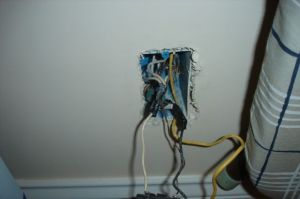Napoleon once said – disparagingly, we might add – that Britain is ‘a nation of shopkeepers’. Whilst that might not be true, and certainly not in this day and age, Britain might be described as a nation of enthusiastic do-it-yourselfers.
Each weekend the DIY stores are packed with people eager to have a crack at those niggling little jobs that need doing, or to maybe undertake a major project, such as building a conservatory. However, when it comes to plumbing, gas and electrical jobs, such concerns are better left to the professionals; and by professionals, we mean certified professionals.
Jobs for an electrician
A homeowner may legally undertake simple tasks involving electricity themselves, such as installing an additional socket or light, or connecting a cooker to an existing connection unit, but that’s about all. Anything more complicated than that, such as installing a new shower circuit or a new cooker circuit, legally requires a qualified electrician. If the homeowner is thinking of taking on a home electrical task themselves, it is always best to see if they are legally entitled to do so.
If there is any doubt on the legality, or the ability to do a safe job, the homeowner should hire a certified electrician instead. It is also the more cost efficient route, because if the owner make a real mess of the task it often costs more to hire an electrician to put things right, than it would have done to have hired an electrician to do the job properly in the first place.
Building Regulations
District councils have responsibility for ensuring that any building works meet the national Building Regulations for efficiency, safety, design and disabled access. Building Regulations must be obtained from the local council before any structural alteration is made to a home. Such regulations are easier to obtain if the homeowner can prove they are going to be using a qualified electrician to undertake the work.
Part P qualified
A Part P qualified electrician is one who is able to sign off their own work in domestic properties; an electrician who is not Part P qualified has to seek local authority building control to approve their work. This is something that all homeowners should bear in mind when they are looking to hire a qualified electrician.
Risks
Electricity is dangerous. You don’t have to have 10,000 volts pumped through you to zap you into your grave. The seemingly mundane 230V domestic supply is enough to kill. Our bodies use electrical signals to control our organs. Unwanted electricity interrupts these signals, causing hearts and lungs to stop functioning, resulting in death. Electrical faults can also start fires. Poorly installed electronics are incredibly dangerous. Homeowners could lose everything – if their house burns to the ground because they installed some faulty wiring themselves against Building Regulations, they may find the property is not insured and the insurance company is not legally obliged to reimburse them. On average, around 30 people die each year due to low voltage electrocutions and electrical burns. In addition, two and a half million people will receive a mains voltage electric shock every year, and 350,000 will receive a serious injury. Another 46 will die each year as an indirect result of faulty electrical wiring or the poor installation of electrical equipment.
Differing standards
 The majority of contractors in the UK are reliable and are certified as such. To become a qualified electrician takes between three and five years of study. Some contractors may however pass themselves off as qualified, citing qualifications obtained in other EU countries. However, the standards in wiring differs across both the EU and the rest of the world, so what qualifies as a qualified electrician in one country is unlikely to be anywhere near the standard required in the UK.
The majority of contractors in the UK are reliable and are certified as such. To become a qualified electrician takes between three and five years of study. Some contractors may however pass themselves off as qualified, citing qualifications obtained in other EU countries. However, the standards in wiring differs across both the EU and the rest of the world, so what qualifies as a qualified electrician in one country is unlikely to be anywhere near the standard required in the UK.
Registers
To find an electrical contractor to undertake domestic tasks, the best place to start is often a register such as the Electrical Safety Register at www.electricalsafetyregister.com.
Electricians who register with the Electrical Safety Register must meet a very high industry standard, which means that consumers who use an ESR registered contractor are guaranteed an exceptionally high standard of work. In addition, all work carried out by Electrical Safety Register contractors is guaranteed. Any deficiencies in the work carried out are resolved at no extra cost.
Kick out the cowboys
Electricians with bogus qualifications who perform shoddy work are a continual problem in the UK. Despite their poor performances, such workmen still expect to be paid for their work and can get heavy handed if payment is refused, especially against the vulnerable. In an effort to show up shoddy workmanship, Gil-Lec has set up a Twitter campaign that uses the hashtag #KickOutCowboys. Anyone who provided poor electrical work can be named and shamed via the Twitter campaign. Twitter users are encouraged to post photographs of poor electrical work, coupled with the name of the individual or company who performed the work.







